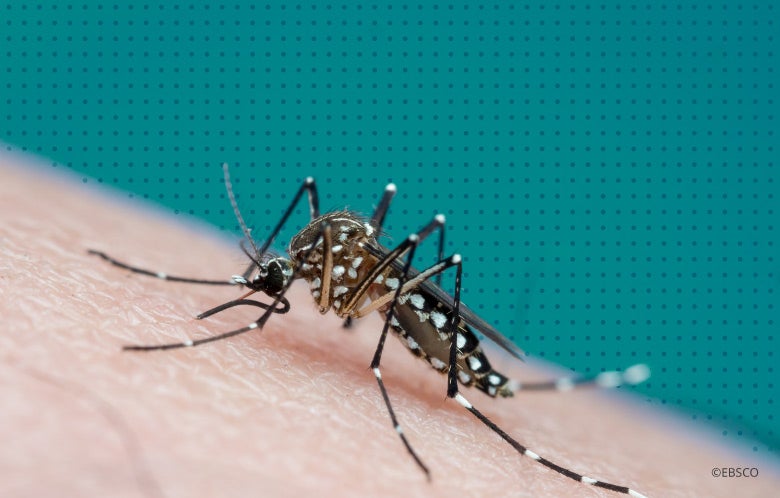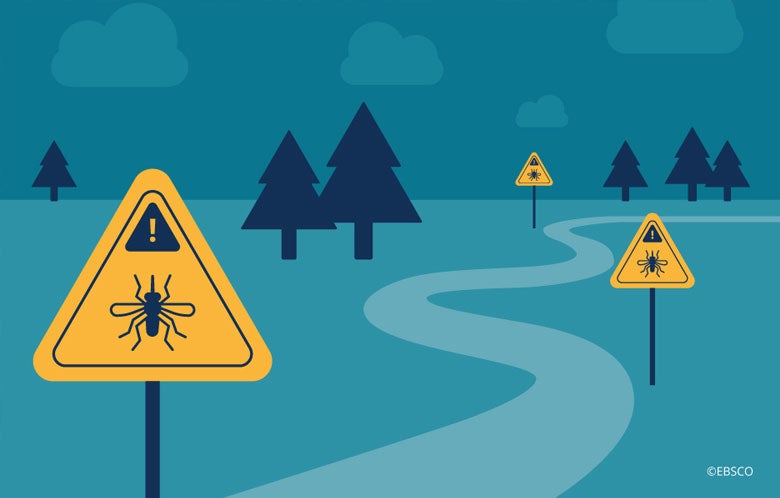Although COVID-19 has captured the world’s attention over the past year, other infectious diseases haven’t stopped causing illness worldwide – and researchers haven’t stopped making progress in fighting them either. A recent study published in the New England Journal of Medicine (NEJM) describes a novel approach to combat dengue virus infection.
Dengue is a mosquito-borne disease common to more than 100 countries around the world, with hotspots in Asia and South America. Each year, up to 400 million people are infected with dengue, which is transmitted by Aedes aegypti mosquitoes carrying any of the four serotypes of dengue virus. About one in four people infected with dengue become ill, with symptoms including nausea, vomiting, rash, aches and pains, and signs of internal bleeding. Dengue can become severe within hours, and severe dengue can result in death. In endemic areas, dengue is often a leading cause of illness, and stopping the spread of infection is difficult. Although a new dengue vaccine has been recently approved by the FDA, mosquito-based infection control may be even more effective at preventing the spread of disease, and it can be combined with other methods as well.
For decades, mosquito control measures have primarily consisted of insecticides or environmental management, which have not managed to effectively control dengue in most places. Additionally, insecticides carry health risks to other wildlife and human inhabitants. To find a more specific method of mosquito control, researchers from the Applying Wolbachia to End Dengue study group had to think smaller — even microscopic.
Building on pilot studies, the group took advantage of a natural insect predator, Wolbachia pipientis. The group used stable transinfection to create a line of mosquitoes infected with wolbachia that are unable to transmit the dengue virus when the mosquito takes a blood meal. Because the bacteria are maternally inherited, they are transferred to the next generation during mosquito mating, but wolbachia go above and beyond — they manipulate the results of reproduction between wild-type and wolbachia-infected mosquitoes, ensuring that only wolbachia-infected progeny are viable. Thus, introducing enough wolbachia-infected mosquitoes in an area results in wolbachia-infected mosquitoes predominating over time. In contrast to insecticide use, with this method, mosquitoes remain in the ecosystem but are not able to transmit dengue virus.
A cluster-randomized trial in Yogyakarta, Indonesia, evaluated the efficacy of deploying wolbachia-infected mosquitoes for controlling dengue. The trial site was subdivided into 24 geographical clusters, with 12 randomly assigned to receive deployments of wolbachia-infected mosquitoes (intervention clusters) and 12 assigned to receive no deployments (control clusters). Where possible, the regions were separated by natural geographic borders to slow the travel of mosquitoes between clusters, and the median cluster-level prevalence was 95.8 percent over the 27-month period. The trial included 8,144 people ranging from three to 45 years of age, 3,721 of whom lived in intervention clusters and 4,423 of whom lived in control clusters. Participants were monitored at a network of primary care clinics, and reverse transcriptase polymerase chain reaction (RT-PCR) was used to test for dengue infection.
Within 12 months after the introduction of wolbachia-infected mosquitoes, the effects in the population were clear. In the intention-to-treat analysis, virologically confirmed dengue infection occurred in 2.3 percent of participants in intervention clusters and 9.4 percent of participants in control clusters (aggregate odds ratio 0.23, 95% CI 0.15-0.35). The protective efficacy of this intervention was 77.1 percent overall (95% CI 18.2-89.7%) and was similar across all four dengue virus serotypes but was highest for the dengue virus-2 serotype (83.8% protective efficacy, 95% CI 72.1-90.6%). The intervention also lowered the incidence of hospitalization for dengue and for overall hospitalization for any cause.
Although further studies are needed to better understand the dynamics of mosquito populations and potential negative consequences with the introduction of wolbachia, these results suggest that a molecular approach to controlling the mosquito population may be feasible and effective. Importantly, because the intervention is maintained in the mosquito population, it does not need reapplication. The strategy may also be versatile, with applications for combating other mosquito-borne diseases. This new method brings hope that researchers may one day be able to prevent the spread of dengue, even eliminating the disease in treated areas.



